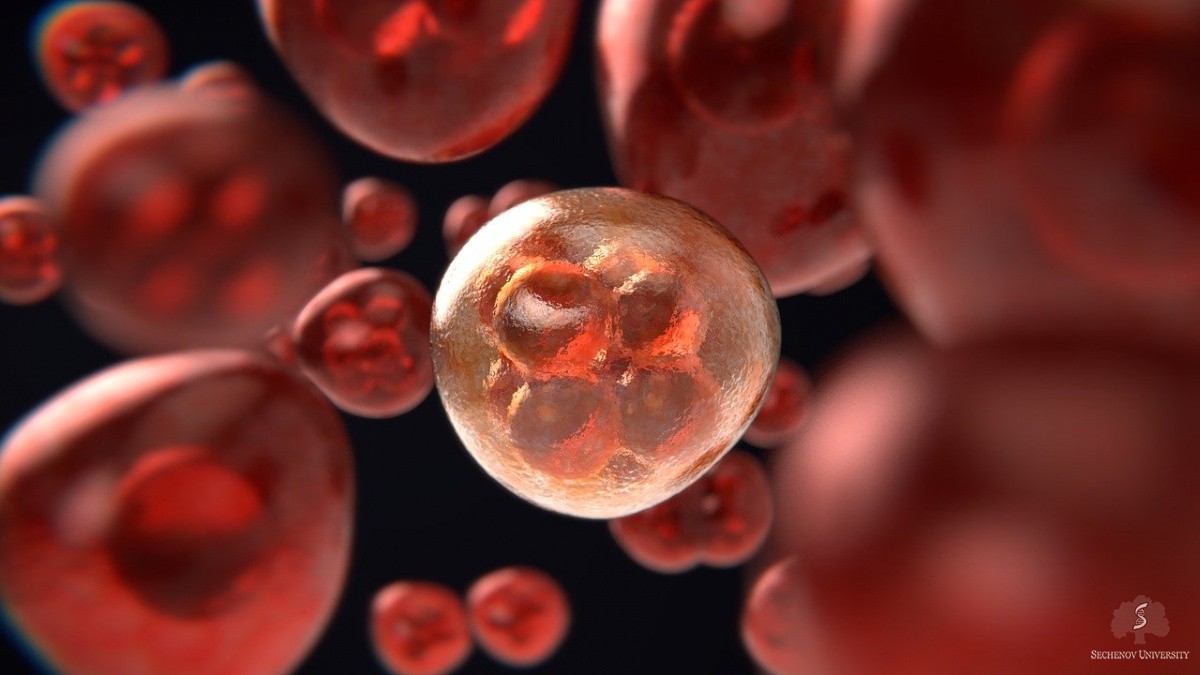-
About University
- Mission & Brand Strategy
- University Leadership
- Rector's Welcome
- History
- Regulatory Documents
- Contacts
- Staff
- International Recruitment
- Partners
Applicants- Why Sechenov University
- Degree Programmes in English
- Preparatory Training
- Non-Degree Programmes
- Transfer from other Institutions
- FAQs
28.08.2020Cathepsin inhibitors can be used as anticancer drugs
 Certain enzymes called cysteine cathepsins are crucial in kidney cancer. Suppression of their activity can be used to treat such tumours. Sechenov scientists proposed a new type of cathepsin inhibitors and confirmed their efficiency and potential for medical use.
Certain enzymes called cysteine cathepsins are crucial in kidney cancer. Suppression of their activity can be used to treat such tumours. Sechenov scientists proposed a new type of cathepsin inhibitors and confirmed their efficiency and potential for medical use.
Renal cancer, which affects the kidneys, is estimated to be in the top 15 most common malignancies worldwide. The cases of the disease can be quite complicated as the tumours often do not respond well to radiotherapy or chemotherapy. Surgery is usually chosen as the treatment strategy, however, the search for new types of drugs is ongoing. For example, cysteine cathepsins, which are enzymes found in enhanced amounts in patients with renal cancer, play a role in the spreading of the tumour. Inhibition of these enzymes can have a therapeutic effect. Sechenov University scientists engineered new inhibitors of cysteine cathepsins and evaluated not only their anticancer activity but also the molecular aspects of their action. The results have been reported in the journal Cancers.
The importance of cysteine cathepsins is enormous. They are lysosomal proteases which belong to the C1 family of papain-like enzymes. Cysteine cathepsins perform the degradation and turnover of cellular and extracellular proteins, thus maintaining cell and tissue homeostasis. As follows from the name of this group of proteases, their proteolytic properties are determined by the cysteine in the active site. Expression of cathepsins — their amount produced by the cells — is unbalanced in many pathologies including cancer. The overexpression (overproduction) of cathepsins is associated with aggressive tumour phenotypes, cancer invasiveness, tumour cell communication, apoptosis, and autophagy.
The researchers designed two small fluoromethyl ketone-containing peptides that could inhibit the enzymes. The structures of these inhibitors were inspired by another substrate. The scientists used computational modelling software to simulate the docking of the inhibitors into the binding site of the cathepsins and ruled out that both inhibitors would occupy predominantly hydrophobic substrate-binding pockets by the valine and leucine side chains.
The inhibitory activity was confirmed by biochemical studies. Cathepsins’ proteolytic performance in vitro was considerably affected in the presence of the peptide inhibitors. The experiments on human renal cancer cells included treatment with the inhibitors followed by exposure to a fluorogenic probe — a cleavage target for cathepsins. Both peptides significantly reduced the fluorescence resulting from probe degradation. It confirmed the inhibition of the cellular cathepsins. At the same time, the inhibitors almost did not interfere with cell viability. In addition, the analysis of the cell biology aspects of the designed peptides showed that both of them effectively decreased colony numbers — meaning that fewer cancer cells grew.
‘Cysteine cathepsins are best known as enzymes which degrade proteins in lysosomes — the main cellular compartments where “digestion” occurs. Humans have 11 cathepsins, and we do not know yet why we need so many enzymes that are so similar to each other’, says Andrey Zamyatnin Jr, who works at the Institute of Molecular Medicine (Sechenov University) and is the corresponding author of the paper. ‘At the same time, there is more and more data on the presence of cathepsins in other compartments and in the extracellular space. In some cancers, cathepsins are involved in oncogenesis and metastatic growth. We have designed inhibitors which could “deactivate” cathepsins in renal cancer, and we hope that it could be the first step in the development of new anticancer drugs’.
Future experiments will have to take into consideration the probable side effects of the new inhibitors, their in vivo impact, and potential synergy with currently available chemotherapy.
The study was performed by Sechenov University (Institute of Molecular Medicine, Institute for Regenerative Medicine) together with Lomonosov Moscow State University (Faculty of Bioengineering and Bioinformatics, Belozersky Institute of Physico-Chemical Biology) and Russian Academy of Sciences (Shemyakin-Ovchinnikov Institute of Bioorganic Chemistry).
Read more: Rudzińska M, Parodi A, Maslova VD, Efremov YM, Gorokhovets NV, Makarov VA, Popkov VA, Golovin AV, Zernii EY, Zamyatnin AA Jr. Cysteine Cathepsins Inhibition Affects Their Expression and Human Renal Cancer Cell Phenotype. Cancers (2020).
Photo credit: Pixabay 3876669Embed on website
Cathepsin inhibitors can be used as anticancer drugs
Certain enzymes called cysteine cathepsins are crucial in kidney cancer. Suppression of their activity can be used to treat such tumours. Sechenov scientists proposed a new type of cathepsin inhibitors and confirmed their efficiency and potential for medical use.
Renal cancer, which affects the kidneys, is estimated to be in the top 15 most common malignancies worldwide. The cases of the disease can be quite complicated as the tumours often do not respond well to radiotherapy or chemotherapy. Surgery is usually chosen as the treatment strategy, however, the search for new types of drugs is ongoing. For example, cysteine cathepsins, which are enzymes found in enhanced amounts in patients with renal cancer, play a role in the spreading of the tumour. Inhibition of these enzymes can have a therapeutic effect. Sechenov University scientists engineered new inhibitors of cysteine cathepsins and evaluated not only their anticancer activity but also the molecular aspects of their action. The results have been reported in the journal Cancers.
The importance of cysteine cathepsins is enormous. They are lysosomal proteases which belong to the C1 family of papain-like enzymes. Cysteine cathepsins perform the degradation and turnover of cellular and extracellular proteins, thus maintaining cell and tissue homeostasis. As follows from the name of this group of proteases, their proteolytic properties are determined by the cysteine in the active site. Expression of cathepsins — their amount produced by the cells — is unbalanced in many pathologies including cancer. The overexpression (overproduction) of cathepsins is associated with aggressive tumour phenotypes, cancer invasiveness, tumour cell communication, apoptosis, and autophagy.
The researchers designed two small fluoromethyl ketone-containing peptides that could inhibit the enzymes. The structures of these inhibitors were inspired by another substrate. The scientists used computational modelling software to simulate the docking of the inhibitors into the binding site of the cathepsins and ruled out that both inhibitors would occupy predominantly hydrophobic substrate-binding pockets by the valine and leucine side chains.
The inhibitory activity was confirmed by biochemical studies. Cathepsins’ proteolytic performance in vitro was considerably affected in the presence of the peptide inhibitors. The experiments on human renal cancer cells included treatment with the inhibitors followed by exposure to a fluorogenic probe — a cleavage target for cathepsins. Both peptides significantly reduced the fluorescence resulting from probe degradation. It confirmed the inhibition of the cellular cathepsins. At the same time, the inhibitors almost did not interfere with cell viability. In addition, the analysis of the cell biology aspects of the designed peptides showed that both of them effectively decreased colony numbers — meaning that fewer cancer cells grew.
‘Cysteine cathepsins are best known as enzymes which degrade proteins in lysosomes — the main cellular compartments where “digestion” occurs. Humans have 11 cathepsins, and we do not know yet why we need so many enzymes that are so similar to each other’, says Andrey Zamyatnin Jr, who works at the Institute of Molecular Medicine (Sechenov University) and is the corresponding author of the paper. ‘At the same time, there is more and more data on the presence of cathepsins in other compartments and in the extracellular space. In some cancers, cathepsins are involved in oncogenesis and metastatic growth. We have designed inhibitors which could “deactivate” cathepsins in renal cancer, and we hope that it could be the first step in the development of new anticancer drugs’.
Future experiments will have to take into consideration the probable side effects of the new inhibitors, their in vivo impact, and potential synergy with currently available chemotherapy.
The study was performed by Sechenov University (Institute of Molecular Medicine, Institute for Regenerative Medicine) together with Lomonosov Moscow State University (Faculty of Bioengineering and Bioinformatics, Belozersky Institute of Physico-Chemical Biology) and Russian Academy of Sciences (Shemyakin-Ovchinnikov Institute of Bioorganic Chemistry).
Read more: Rudzińska M, Parodi A, Maslova VD, Efremov YM, Gorokhovets NV, Makarov VA, Popkov VA, Golovin AV, Zernii EY, Zamyatnin AA Jr. Cysteine Cathepsins Inhibition Affects Their Expression and Human Renal Cancer Cell Phenotype. Cancers (2020).
Photo credit: Pixabay 3876669



